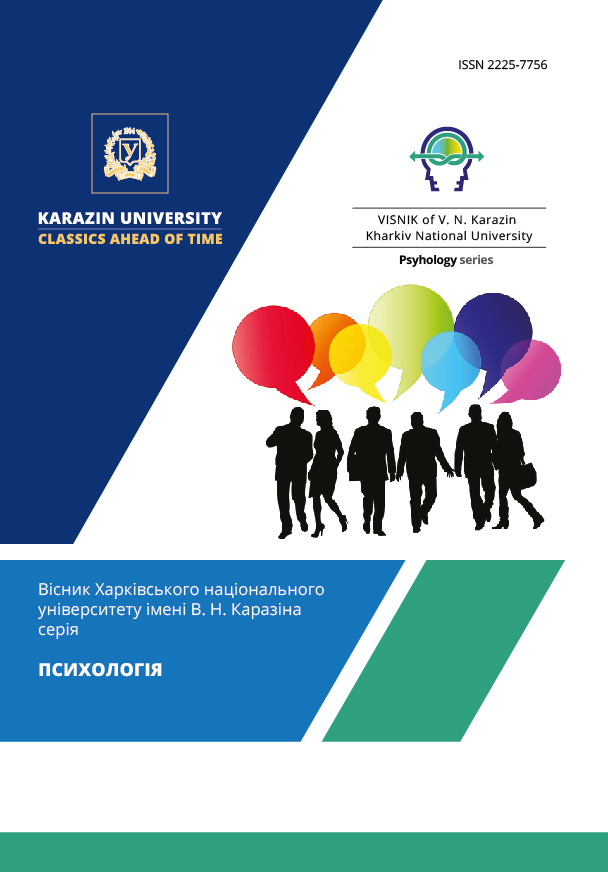Вплив негативних спогадів особистості на особливості самосприйняття
Анотація
Питання впливу пам’яті на особистість є актуальним і таким, що потребує експериментального дослідження. В статті подано теоретичний аналіз аспектів автобіографічної пам'яті, які здатні сполучати сфери функціонування особистості та мнемічних процесів. В контексті розвитку ідей Г. К. Середи щодо взаємозв’язку і взаємовпливу пам'яті й особистості було проведене емпіричне дослідження, метою якого стало вивчення впливу негативних спогадів на особливості самосприйняття особистості у людей середнього та старшого віку. Методом дослідження особливостей самосприйняття обрано багатофакторний особистісний опитувальник Р. Кеттелла. Автобіографічне інтерв’ю, покликане актуалізувати негативні спогади, зайняло позицію експериментального втручання, стало джерелом спогадів і матеріалу для аналізу. Було з’ясовано, що актуалізація негативних спогадів особами старшого віку призводить до низки зрушень у самосприйнятті власної особистості безпосередньо після процесу пригадування.
Завантаження
Посилання
Baddeley, A. D., Eysenck, M. W., & Anderson, M. C. (2015). Memory (Second edition). Psychology Press. https://docer.com.ar/doc/nx100ee
Brown, N. R. (2021). The possible effects of the COVID-19 pandemic on the contents and organization of autobiographical memory: A Transition-Theory perspective. Cognition, 212, 104694. https://doi.org/10.1016/j.cognition.2021.104694
Cassol, H., Bonin, E., Bastin, C., Puttaert, N., Charland-Verville, V., Laureys, S., & Martial, C. (2020). Near-Death Experience Memories Include More Episodic Components Than Flashbulb Memories. Frontiers in psychology, 11, 888. https://doi.org/10.3389/fpsyg.2020.00888
Fivush, R., Habermas, T., Waters, T. E., & Zaman, W. (2011). The making of autobiographical memory: intersections of culture, narratives and identity. International journal of psychology, 46(5), 321–345. https://doi.org/10.1080/00207594.2011.596541
Zinchenko, P. I. (2010). Involuntary memory. Moscow: Directmedia Publishing. [in Russian]
Ivanova, O. F. (2021). Autobiographical memory as a personal resource, Proceedings of the scientific-practical conference "Problems of personal resources in educational and professional activities". Kharkiv: V. N. Karazin Kharkiv National University. [in Ukrainian]
Ivanova, O. F. (2017). Cultural memory and its influence on autobiographical memory. The Journal of V. N. Karazin Kharkiv National University. A Series of «Psychology», (62), 44–47. Retrieved from https://periodicals.karazin.ua/psychology/article/view/9411 [in Ukrainian]
Ivcevic, Z., Pillemer, D. B., Wang, Q., Hou, Y., Tang, H., Mohoric, T., & Taksic, V. (2008). When we feel good and bad about ourselves: self-esteem memories across cultures. Memory (Hove, England), 16(7), 703–711. https://doi.org/10.1080/09658210802251406
Kapoustina, A. N. (2001). The multifactorial personality technique of R. Kettell. Sankt-Peterburg: Rec`. [in Russian]
LePort, A. K., Stark, S. M., McGaugh, J. L., & Stark, C. E. (2016). Highly Superior Autobiographical Memory: Quality and Quantity of Retention Over Time. Frontiers in psychology, 6, 2017. https://doi.org/10.3389/fpsyg.2015.02017
Lyubomirsky, S., Sousa, L., & Dickerhoof, R. (2006). The costs and benefits of writing, talking, and thinking about life's triumphs and defeats. Journal of personality and social psychology, 90(4), 692–708. https://doi.org/10.1037/0022-3514.90.4.692
Nourkova, V. V. (2009). Cultural-historical Approach to Autobiographical Memory. [Doctoral thesis, Moscow State University]. Moscow. [in Russian]
Nourkova, V. V. (2022). Self-defining Memories in the System of Self-Memory Interfunctional Relationships. Cultural-Historical Psychology, 18(1), 79–89. https://doi.org/10.17759/chp.2022180108 [in Russian]
Nourkova, V. V., & Vasilenko, D. A. (2013). Forming of variative repertory of self-defining recollections as mean for developing of self-identity. RSUH/RGGU Bulletin. Series: Psychological Studies, 18 (119), 11–30. Retrieved from https://cyberleninka.ru/article/n/formirovanie-variativnogo-repertuara-samoopredelyayuschih-vospominaniy-kak-sredstvo-razvitiya-samoidentichnosti-1/viewer [in Russian]
Patihis, L., Frenda, S. J., LePort, A. K. R., Petersen, N., Nichols, R. M., Stark, C. E. L., McGaugh, J. L., & Loftus, E. F. (2013). False memories in highly superior autobiographical memory individuals. PNAS Proceedings of the National Academy of Sciences of the United States of America, 110(52), 20947–20952. https://doi.org/10.1073/pnas.1314373110
Ross, M., & Wang, Q. (2010). Why We Remember and What We Remember: Culture and Autobiographical Memory. Perspectives on psychological science : a journal of the Association for Psychological Science, 5(4), 401–409. https://doi.org/10.1177/1745691610375555
Sereda, G. K. (2010). Selected psychological works. Kharkiv: V. N. Karazin Kharkiv National University. [in Russian]




